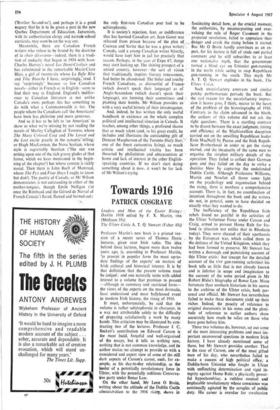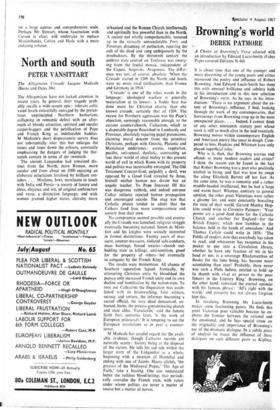Towards 1916
PATRICK COSGRAVE
The Ulster Crisis A. T. Q. Stewart (Faber 45s) Professor Martin's new book is a printed ver- sion of a recent series of Thomas Davis lectures, given over Irish radio. The idea behind these lectures, begun more than twelve years ago, is, according to Professor Martin, 'to present in popular form the most up-to- date findings of the experts' on matters of Irish cultural and historical interest. It is by that definition that the present volume must be judged : and one naturally turns with added interest to a volume that promises to present —although in summary and restricted form— the views of the experts on the most dramatic, least understood and most ballyhooed event in modern Irish history, the rising of 1916.
It must, unfortunately, be said that the volume is rather schizophrenic in character, in a way not attributable solely to the difficulty of preparing satisfactorily a work by many hands. This criticism may be illustrated by con- trasting two of the lectures. Professor J. C. Beckett's contribution on Edward Carson is the most lucid, forceful and well-organised of the essays, but it tells us nothing new, nothing that is not common knowledge, and its author makes no attempt to provide us with a considered and expert view of some of the still dark aspects of Carson's career, such, for ex- ample, as his day-to-day relationship, as the leader of a potentially revolutionary force in Ulster, with the potentially seditious Conserva- tive party under Bonar Law.
On the other hand, Mr Leon 0 Broin, writing about the attitude of the Dublin Castle administration to the 1916 rising, shows in the only first-rate Canadian poet had to be - fascinating detail how, at the crucial moment, schizophrenic. the authorities, by misinterpreting and over- It is society's rejection, fear, or indifference valuing the role of Roger Casement in the that has harmed Canadian art. Jean Genet was projected revolution, failed to appreciate their released from prison because of the plea of clanger and crush the rising before it started.
Cocteau and Sartre that he was a great writer; But Mr 0 Broin hardly convinces as an ex- Canada, said a young Canadian writer bitterly, pert, for his lecture is full of snide and partial would have kept him in jail for precisely that comment and he still subscribes to at least reason. Perhaps, in the year of Expo 67, things one nationalist myth, that the government may start looking up. The shining prospect of a turned a blind eye on Unionist gun-running united country, however—the sort of vision r in the north while acting to stop Republican that traditionally inspires literary renascences, gun-running in the south. This myth Mr A. T. Q. Stewart explodes in his book, The Ulster Cthis.
Such unsatisfactory contrasts and similar patchy performances pervade the book. But the real reason for the unsatisfactory impres- sion it leaves goes, I think, nearer to the heart of the problem of the historiography of 1916. Contrary to the claim advanced in the blurb, the authors of this volume did not ask the right questions. There is a startling contrast to be drawn between the exact judgment, timing and efficiency of the Machiavellian deception carried out on the unwilling Republican leader Eoin MacNeill by Pearse and the Irish Repub- lican Brotherhood in order to get the rising started, and the incapacity of the same men to organise the simplest military details of the operation. They failed to collect their German guns and they failed on the day to strike a decisive blow by capturing the undefended Dublin Castle. Although Professors Williams, Martin and Nowlan all throw some light on the psychology and organisation behind the rising, there is nowhere a comprehensive account. There is, in fact, no coordination of intention throughout the book and the writers do not, in general, seem to have decided on exactly what they wanted to do.
The inefficiency of the Republican Irish rebels found no parallel in the activities of the Ulster Volunteer Force under Carson and Craig, armed to prevent Home Rule for Ire- land (a situation not unlike that in Rhodesia today). They were cheated of their apotheosis • by the European war, which called them to
the defence of the United Kingdom, which they had been formed to preserve. Mr Stewart has written a thorough and painstaking account of this Ulster crisis: but (except for the detailed account of the UVF gun-running activities) his book tells us little that is not already known and is inferior in scope and imagination to the account of the same period given in Mr Robert Blake's biography of Bonar Law. More fortunate than southern historians in his access to the archives of the Ulster crisis, both per- sonal and official, Mr Stewart has nevertheless failed to make these documents yield up their riches. Indeed, the paucity of reference to original documents in his notes and the pleni- tude of reference to earlier authors show accurately how much he relies on those who have gone before him.
These two volumes do, however, set out some of the most interesting problems and most im- portant unanswered questions in modern Irish history. I have already mentioned some of these, but Mr Stewart provides another. That is the case of Carson, one of the most gifted men of his day, who nevertheless failed to make a success of high political office; a Dublin-born Unionist who fought in Ulster with unflinching determination and rigid in- tegrity against Home Rule; a physically power- ful hypochondriac; a ruthless counsel and implacable revolutionary whose conscience was continually agitated by the scruples of public duty. His career is overdue for revaluation on a large canvas and comprehensive scale. Perhaps Mr Stewart, whose fascination with Carson is clear, will undertake to replace Marjoribanks, Colvin and Hyde with a more enduring volume.































 Previous page
Previous page